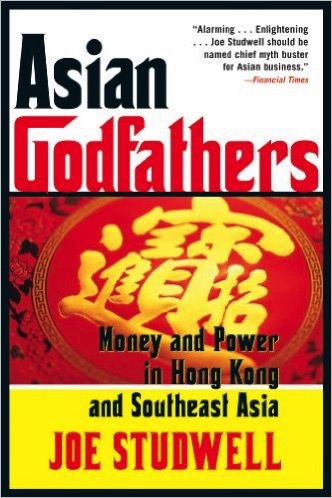Note: I have long kept, on index cards, written notes about the books I read. I decided to share some of these thoughts here, and will be posting them, one by one on individual books, in no particular order. I’ll group them all together on a central page later. Thanks to Derek Sivers for the inspiration.

Asian Godfathers: Money and Power in Hong Kong and Southeast Asia
By Joe Studwell
Published: Oct. 2007
Read: Nov. 2015
Amazon link
Brief recap: An incisive look at how Southeast Asia’s godfathers got rich by exploiting the region’s dysfunctional governments — and how local elites have used godfathers, in turn.
One of the best books, if not the very best, on the region that I’ve encountered; should be required reading for anyone with an interest in the history of modern Southeast Asia.
My notes:
-
The region’s godfathers — largely Chinese and Indians — emigrated to Southeast Asia before World War II, taking advantage of opportunities for concessions and monopolies from local political elites in exchange for not seeking their own political power. Typical godfather behavior would be, for example, to bribe local politicians for lucrative monopolies, which they then used to build their own fortunes. Local elites got a steady stream of incoming cash in return, and weren’t challenged in the governmental sphere.
-
Southeast Asia and Hong Kong have very few global brands because they employ “technology-less industrialization” — entrepreneurs seek rents and have monopolies, so don’t need to improve productivity or become globally competitive.
-
The economic landscape in Southeast Asia and Hong Kong is “shaped by the interaction of two historical forces: migration and colonization.” That is, migrants came to Southeast Asia and began building their riches by taking advantage of colonial systems.
-
Thailand’s Thaksin was a godfather who committed the sin of political ambition — and alienated his fellow godfathers.
-
Studwell is highly critical of Singapore despite the fact it is known globally for good governance and its outsized economic development. He argues that its small size makes comparisons with countries irrelevant, and that both the city-state and Hong Kong show that small cities with deep water ports and good banking facilities were always destined to flourish in the region, despite their very different political models. “As relatively easily managed city states, with highly motivated and purely immigrant populations,” Studwell writes, “Hong Kong and Singapore perform a simple economic trick: they arbitrage the relative economic inefficiency of their hinterlands. In other words, business comes to them because they perform certain tasks — principally services — a little better than surrounding countries.”